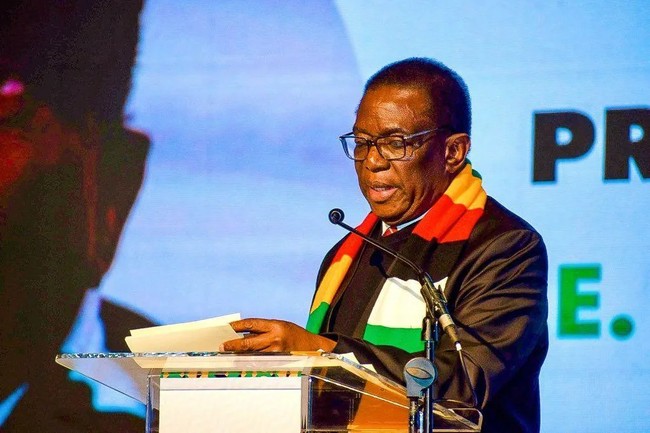HARARE — Amid growing uncertainty over Zimbabwe’s political trajectory, a high-ranking ZANU-PF insider has revealed that President Emmerson Mnangagwa will not seek office beyond his constitutionally mandated two terms, ending in 2028.
The revelation comes against the backdrop of mounting speculation surrounding the so-called “ED2030 Agenda,” an informal campaign believed to be pushing for Mnangagwa’s continued rule beyond constitutional limits.
The insider, who spoke to The Zimbabwe Mail on condition of anonymity due to the sensitivity of the matter, claimed that far from plotting a term extension, Mnangagwa has been quietly engineering a succession plan centred around businessman Kudakwashe Tagwirei—one of Zimbabwe’s most influential and controversial figures. Tagwirei, a petroleum magnate with vast interests in mining, banking, and agriculture, is said to enjoy the President’s personal confidence and financial trust, particularly in party funding and state-backed projects.
According to the source, Mnangagwa’s long-term strategy involves positioning Tagwirei as a political player within the ZANU-PF hierarchy, effectively bypassing Vice President Constantino Chiwenga, whose relations with Mnangagwa have reportedly soured since the 2017 military intervention that brought the current administration to power.
“The President sees Tagwirei as someone who can safeguard his political and economic legacy while keeping the party financially stable,” the insider said. “Chiwenga has become isolated, and his influence has been systematically reduced within both government and party structures.”
A Party at Crossroads
The move to co-opt Tagwirei into the ZANU-PF Central Committee has been interpreted by analysts as a calculated effort to dilute the influence of the so-called “military wing” of the party, historically aligned with Chiwenga. Reports suggest that Local Government Minister July Moyo—long seen as a Mnangagwa loyalist—may also feature prominently in the evolving power matrix. This manoeuvring, insiders claim, signals a broader realignment ahead of ZANU-PF’s elective congress scheduled for 2026, where the question of succession could take centre stage.
“ZANU-PF is managing a very delicate balance,” said political analyst Dr. Ibbo Mandaza. “If Mnangagwa truly intends to step down in 2028, then his succession plan must appease multiple factions—the business elite, the military establishment, and the party grassroots. Tagwirei’s wealth and influence make him a unifying figure for some and a divisive one for others.”
Echoes of a Broken Pact
At the heart of the growing internal rift lies an alleged “gentlemen’s agreement” forged during the 2017 coup that ousted Robert Mugabe. Under that informal pact, Mnangagwa was reportedly to serve one full term and later hand over power to Chiwenga, who was instrumental in orchestrating Mugabe’s removal. However, that understanding appears to have unraveled as Mnangagwa consolidated power through successive cabinet reshuffles and party congress resolutions.
A senior ZANU-PF youth official, also speaking anonymously, said: “There was a time when the military faction believed Chiwenga would naturally take over after ED. But politics has changed. The President no longer trusts anyone who played a central role in the coup. Tagwirei and a few technocrats are now his new power circle.”
Opposition and Civil Society Reaction
Opposition figures have dismissed the “ED2030” movement as both unconstitutional and politically manipulative. Wilbert Mubaiwa, leader of the National People’s Congress (NPC), told reporters that his party was preparing for the 2028 elections “in whatever form they come,” describing the 2030 narrative as a smokescreen. “The idea that Mnangagwa will stay beyond 2028 is a distraction from real governance failures,” he said.
Civic organisations have warned that any attempt to amend the Constitution or extend the presidential term limit would provoke public unrest and international condemnation. Prominent constitutional lawyer and opposition legislator Tendai Biti described such efforts as “a direct assault on democracy,” warning that “tampering with term limits will destroy investor confidence and plunge Zimbabwe into another cycle of political and economic instability.”
Economic Stakes and International Scrutiny
Since coming to power in 2017, Mnangagwa has marketed his administration as the “Second Republic,” promising economic revival and engagement with the international community. However, renewed talk of political succession—and the alleged grooming of a private businessman as a political heir—has unsettled both investors and diplomatic partners.
Western diplomats in Harare privately express concern that Zimbabwe’s governance trajectory could regress if the succession process is mishandled. One European envoy, speaking on background, noted: “Zimbabwe has made limited progress in re-engagement. Any sign of internal instability or elite power struggles could undo that progress and discourage investment.”
Domestically, economists warn that political uncertainty could erode confidence in the government’s stabilisation measures, particularly efforts to restore the Zimbabwe dollar and curb inflation. “Politics and economics are deeply intertwined,” said economist Gift Mugano. “If the political question of succession is not resolved transparently, it will feed market volatility and capital flight.”
Looking Ahead
As ZANU-PF heads into another critical election cycle, the question of who succeeds Mnangagwa looms large. The President’s inner circle continues to project confidence, insisting that he remains committed to constitutionalism. Yet within the corridors of power, suspicion, ambition, and fear intermingle—echoes of a liberation movement grappling with its own mortality.
Whether Mnangagwa steps aside in 2028, as the Constitution dictates, or attempts to extend his stay through legal or political manoeuvres, will define not only his legacy but also Zimbabwe’s democratic future.
For now, the silence from State House speaks volumes. The succession question—once whispered in corridors—is fast becoming the central debate shaping Zimbabwe’s political landscape.
